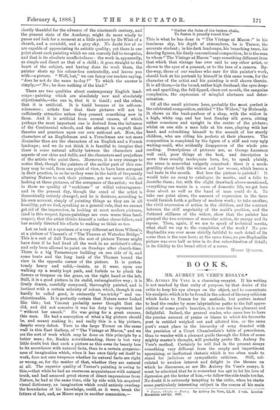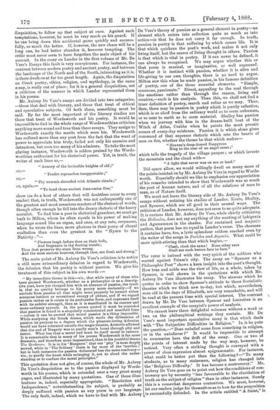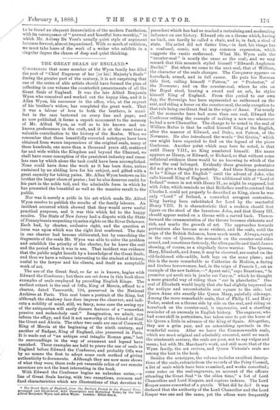'BOOKS.
MR. AUBREY DE VERE'S ESSAYS.* Mn. AUBREY DE VERB is a charming essayist. If his writing is not marked by that unity of purpose, by that desire of the critic to keep his eye always on the object, and to concentrate his analysis, which is to be found in the school of literary criticism which looks to France for its methods, but prefers instead to lead the reader by more labyrinthine paths to the full appre- ciation of some poet's beauties, it is none the less pleasant and delightful. Indeed, the general reader, who cares less to have the precise amount of praise or blame to which his favourite poet is entitled weighed out and allotted him, or the same poet's exact place in the hierarchy of song denoted with the precision of a Court Chamberlain's table of precedence, than to wander with a pleasant guide through the Eden of some mighty master's thought, will probably prefer Mr. Aubrey Be Vere's method. Certainly he will find in the present essays something very different from the empty and impertinent
appraising, or ineffectual rhetoric which is too often made to
stand for judicious or sympathetic criticism. Still, cal- culated to awaken interest and delight in the themes on
which he discourses, as are Mr. Aubrey De Vere's essays, it must be admitted that he is somewhat too apt to let his love of digression get the better of him,—to follow the side-trails too far. No doubt it is extremely tempting to the critic, when he starts some particularly interesting subject in the course of his Inslin.
• Essays, Chiefly on Poetry. By Aubrey De Vora, LL.D. 2 vols. London Macmillan and Co. 1887. disquisition, to follow up that subject at once. Against such temptations, however, he mast be very much on his guard. If he can bring down this accidental game quickly and success- fully, so much the better. If, however, the new chase will be a
long one, he had better abandon it, however tempting. The critic must never seem to have forgotten the main object of his pursuit. In the essay on Landor in the first volume of Mr. De Vere's Essays this fault is very conspicuous. For instance, the contrast between modern poetry and ancient poetry, and between the landscape of the North and of the South, interesting as it is, is there dwelt on at far too great length. Again, the disquisition on Greek poetry, ethics, religion, and mythology, in the same essay, is really out of place ; for it is a general disquisition, not
a criticism of the manner in which Landor represented them in his poems.
Mr. Aubrey De Vere's essays are divided into two categories, —those that deal with literary, and those that treat of ethical and speculative subjects. Of both these, something must be said. By far the most important of the literary studies are those that treat of Wordsworth and his poetry. It would be impossible to find in the whole range of Wordsworthian criticism anything more sound and true than these essays. They assign to Wordsworth exactly the merits which were his. Wordsworth has suffered more than any poet from the fact that the want of power to appreciate him truly, failed not only his enemies and detractors, but even too many of his admirers. To take the most glaring instance, Wordsworth is seldom praised by the Words- worthian enthusiast for his rhetorical power. Yet, in truth, the writer of such lines as,—
" Armory of the invincible knights of old ;"
"Tender reproaches insupportable ;"
or,— " Thy summit shrouded with Atlantic clouds ;" or, again,— " To head those ancient Amazonian files,"
show (as do a host of others that will doubtless occur to every reader) that, in truth, Wordsworth was not unfrequently one of the greatest and most conscious masters of the rhetoric of words, though often enough he fell into the dreary rhetoric of the heavy moralist. To find him a peer in rhetorical grandeur, we must go back to Milton, whom he often equals in his power of making language sound like an organ, and once, at any rate, surpasses, when he wrote the lines, more glorious in their pomp of choral exaltation than even the greatest in the "Hymn to the Nativity : "—
" Flowers laugh before thee on their beds,
And fragrance in thy footing treads ; Thou dost preserve the stars from wrong, And the most ancient heavens, through thee, are fresh and strong."
or,— The main point of Mr. Aubrey De Vere's criticism is to notice a still more extraordinary delusion in regard to Wordsworth, the delusion that his poetry is without passion. We give his treatment of this subject in his own words t-
" My immediate theme is this—viz., that while many of those who have praised Wordsworth, whether as a philosophic or as a descrip- tive poet, have yet charged him with an absence of passion, the truth is, that no quality belongs to his poetry more eminently—if we exclude from passion all that might more properly be termed either sensuous instinct or sensational energy of phrase, and if we regard passion rather as it exists in its profounder form, and expresses itself with its subtler strength, than as it is manifested in its coarser and more ordinary appeals. In the poems quoted it must be conceded that passion is found in a singularly concentrated and manifold form —unless it can be proved that moral passion is a thing impossible. While analysing the Greek drama, which made the delineation of passion its purpose to a degree which the pleasure-loving Athenian would not have tolerated outside the tragic theatre, Aristotle affirmed that the end of Tragedy was to purify man's heart through pity and terror. What has thus a moral end must be itself moral in essence. It is remarkable that in many of his poems Wordsworth is far more dramatic, and therefore more impassioned, than in his youthful drama The Borderers. It is in his ' Margaret ' that our ' pity ' is most deeply moved, while in The Solitary' there is far more of the ' terrible ;' but in both instances the passion delineated has the same tendency— viz., to purify the heart while enlarging it, not to cloud the under- standing or to confuse the moral principles."
This quotation does not give, of course, the whole of Mr. Aubrey De Vere's disquisition as to the passion displayed by Words- worth in his poems, which is extended over a very great many pages, and illustrated by many quotations. One of these illus- trations is, indeed, especially appropriate. "Resolution and Independence," notwithstanding its subject, is probably as deeply suffused with passion as any poem in our language. The only fault, indeed, which we have to find with Mr. Aubrey De Vere's theory of passion as a general element in poetry—an element which enters into reflection quite as much as into action—is that he does not carry it far enough. In truth, passion in poetry is that suffering by which comes life. It is that which quickens the poet's work, and makes it not only living itself, but the source of living thought in others. Passion is that which is vital in poetry. If it can never be defined, it can always be recognised. We may argue whether this or that poem is musical, or imaginative, or well expressed. Whether it is instinct with passion, whether it is alive and life-giving to our own thoughts, there is no need to argue. Milton saw this when he made passion, in his famous definition of poetry, one of the three essential elements. "Simple, sensuous, passionate." Direct, appealing to the soul through the emotions rather than through the reason, living and creative,—such is his analysis. Than this, we shall not find a truer definition of poetry, search and refine as we may. Thus, then, there may be passion in poetry which is purely reflective, which is so aloof from the ordinary world as to seem unhuman, or so near to earth as to seem material. Shelley has passion when we journey with him in the dream-built boat of the Witch of Atlas, Crabbe when he paints the most prosaic scenes of every-day existence. Passion it is which alone gives command of that supreme rhetoric which sets the hearts of men on fire, whether the theme be that which makes-
" Heaven's deep-domed Empyrean
Ring to the roar of an angel onset ;"
which tells the tragedy of the village pauper ; or which irtveste
the mountain and the cloud with— "A light that never was on sea or land."
Did space allow, we would willingly dwell on many more of
the points insisted on by Mr. Aubrey De Vere in regard to Words- worth. Especially should we like to emphasise our appreciation of his remarks intended to show that Wordsworth was as much the poet of human nature, and of all the relations of man to man, as of Nature itself.
We must not leave the literary side of Mr. Aubrey De Vere's
essays without noticing his studies of Landor, Keats, Shelley, and Spenser, which are all good in their several ways. The criticism of Landor, however, does not seem to us quite adequate. It is curious that Mr. Aubrey Be Vere, while chiefly criticising the Hellenics, does not say anything of the meeting of Iphigenia and Agamemnon in the shades. For sustained and majestic pathos, that poem has no equal in Landor's verse. The choruses it contains have, too, a lyric splendour seldom reached even by the writer of the songs in Pericles and Aspasia. What could be more spirit-stirring than that which begins,— " Clash, clash the arms! None other race Shall see such heroes face to face."
The verse is imbued with the very spirit of the soldiers who- warred against Priam's city. The essay on "Spenser as a Philosophic Poet" shows a keen insight into the poet's thought. How true and noble was the view of life, as a whole, taken by Spenser, is well shown in the quotations with which Mr. Aubrey De Yore illustrates his essay. The stanzas which he quotes in order to show Sponsor's attitude to those Socialistic theories which we think new to-day, but which, nevertheless, were old in the days of Elizabeth, are very remarkable, and will be read at the present time with special interest. The contrast drawn by Mr. Be Yore between Spenser and Lucretius is an excellent example of the essayist's power of analysis.
We cannot leave these delightful volumes without a word or
two on the philosophical writings they contain. Mr. De Vere's most important speculative essay is that which deals with "The Subjective Difficulties in Religion." In it he puts the question,—" Does unbelief come from something in religion, or in the unbeliever P" It would be impossible to attempt to summarise here the drift of the essay. One or two of the points of interest made by the way may, however, be noticed. Very often a striking thought is conveyed with a power of close expression almost epigrammatic. For instance, what could be better put than the following?—" To many students, as to many statesmen, religion has changed into the 'Religious Difficulty.' It has become a controversy." Mr, Aubrey De Vere goes on to point out how the conditions of con- troversy are by necessity "less favourable to the elucidation of truth on the subject of religion" than in other instances. Surely this is a somewhat dangerous contention. We must, however, let our readers judge for themselves as to how far the proposition is successfully defended. In the article entitled "A Saint," is
to be found an eloquent denunciation of the modern Pantheism, with its consequence of" avowed and boastful hero-worship," in which Mr. Aubrey De Vere's usually quiet style of argument becomes fervent, almost impassioned. With so much of criticism, we must take leave of the work of a writer who exhibits in a singular degree the charm of deep and quiet thinking.




































 Previous page
Previous page